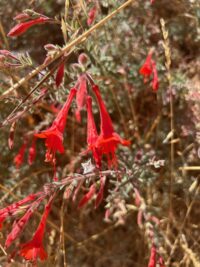
Now that the rain is here and the ground is muddy, it is the best time of year for animal tracking in Sonoma Valley. While our local coyotes, bobcats, fox and other wild creatures live here year-round, finding their tracks is much harder when everything underfoot is hard and dry. Plus, most wildlife is naturally stealthy, leaving little trace moving across the land.
Often, we don’t see the activities of our wild neighbors, but with track and sign we can begin to recognize what they might be up to. Observing a pawprint or the imprint of a deer hoof or the tri-toed scatterings of a quail flock tell me that the wild world is nearby. By following animal tracks, you can sometimes find and quietly observe them in real time.
Animal tracking is a hobby that I’ve taken up more seriously in recent years. Through classes at Santa Rosa Junior College, guidebooks, getting involved in a women’s tracking circle and hours of “dirt-time,” I’ve been learning how to identify tracks, such as whether it’s canine or feline or turkey vulture versus wild turkey.
Canine and feline prints both show four toes and a heel pad. Canine prints are oblong showing toenails and two lobes in the heel pad. Feline tracks are overall rounder showing no toenails with a large heel pad with three lobes.
A wild turkey’s track is considered a “game bird” track with three toes forward and a smaller one back, which registers on the ground as a simple dot. Turkey vultures have “classic” bird tracks with three forward and one back, which is longer and tends to drag leaving marks.
A key sign of the secret lives of the wild is their scat. Coyotes, foxes and bobcats tend to leave clear signs of their transit right on the trail. Coyote remains tend to be twisty containing plant matter, fur and little bones compared to bobcat leavings which are felty and hard from digested fur, bones and meat. Foxes love fruit and seeds and often target their piles on top of mounds, rocks or even picnic tables to claim their turf.
Yet identifying prints and scat is barely scratching the surface. Turns out that animal tracking gets more complex and intriguing the more you look and see. You ask more and more questions about the animal’s behavior, gait, direction of travel, what they’ve eaten, why. Often, you can’t figure it out, and that’s OK. “Put it in your question box and let the mystery unfold,” advises a sage animal tracker.
Animal tracking is an ancient human skill that our species relied on for thousands of years for survival. While the modern world has mostly forgotten about it, I’ve discovered a passionate community of animal trackers locally and around the world that are reviving this knowledge for both nature lovers and professionals. Professional animal trackers get hired to help with studying endangered species, guiding photography and nature tours and sometimes to find bears or cougars in conflict with humans.
Today you can test your skills and get evaluated to be certified as an animal tracker for personal or professional interests through the CyberTracker North America network https://trackercertification.com/ Another fascinating resource is Original Wisdom https://www.originalwisdom.com/, which is operated by the only woman certified Master Tracker in the world, American Kersey Lawrence. I’m taking her online course now.
The best place to start tracking is in your own backyard. Notice what you see. Deer prints? Rabbit pellets? Plants gnawed by a gopher? Scrub jays burying acorns? That is all part of tracking.
Then venture out to open space, along creeks or even roadside mud puddles. I’ve found all kinds of tracks on lesser used trails such as Calabazas Creek and the road to Wingo behind Larsen Family Winery. Going off trail can also be rewarding if you are careful.
What a wild Valley!






Why doesn’t the Sonoma Sun publish who the author is in this online article?
The author is Teri Shore. Here name is at the top, and that’s her photo at top left.